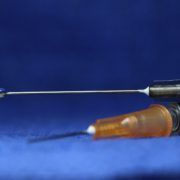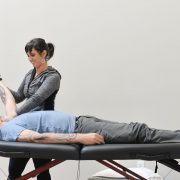Shoulder Impingement Syndrome – Treat the cause not symptoms
Have you ever had pain in your shoulders when you try to raise your arms overhead, pull off a sweatshirt, grab a gallon of milk from the fridge? Or place grocery bags on the counter? You were likely dealing with shoulder impingement syndrome – also known as rotator cuff impingement.
They call it impingement syndrome because your rotator cuff tendons literally get “impinged” between the round head of your shoulder joint and a hook-shaped bone in the front of your shoulder joint (called the acromion) that is part of your shoulder blade.
This can occur for a number of reasons…
You could have a deformity that causes this, an injury could lead to this, arthritis could contribute to this, or poor posture can cause it.
Any of these scenarios can cause crowding in the space where your rotator cuff tendon passes in front of your shoulder. If this happens often enough – it’s going to get irritated every time you raise your arm past 90 degrees.
When this first begins to happen, it will typically cause acute inflammation. You may be diagnosed with rotator cuff tendonitis. But eventually, the more constant pain and irritation of tendonitis subsides and you only feel pain when you go to raise your arm or reach in certain directions.
This is more commonly known as shoulder impingement.
With the exception of a deformity, almost all cases of shoulder impingement can (and should) be resolved naturally.
The tempting and easy fix is to get a cortisone shot to calm the inflammation.
But what you need to understand is that impingement syndrome – in most cases – is actually the symptom of a more overarching problem. And injecting the tendon with cortisone will often cause more harm than good.
The cortisone will temporarily mask your problem. It will eventually cause damage to your tendon if you keep getting injections. Remember, impingement is caused by crowding of the space where your tendon passes through. You can temporarily take the inflammation away and it will feel better. But, unless you address the reason for the crowded space, your problem will keep coming back.
So how do you naturally get rid of shoulder impingement for the long term?
First, you must address the reason for the crowded space in your shoulder joint where your tendon passes through. Most often – it’s due to poor postural habits and immobility around your shoulder joint – specifically your neck and upper back.
For example, if your upper back is stiff, curved, and lacks adequate mobility – it’s going to impact how your shoulder blades move and are positioned.
With a stiff and curved upper back, your shoulder blades will respond by moving out and up. This scenario makes that hook-like bone (the acromion) sit more forward and down than it should. When this happens, there isn’t enough room for your tendon when you lift your arm above shoulder height. The bony surfaces above and below your tendon create friction and this eventually turns into pain and inflammation. This can happen slowly over time. Or, more quickly if you’ve got something like arthritis where that space might have naturally already narrowed.
Another common scenario is after a shoulder injury. Your neck and upper back may have learned to compensate for a time while you were healing from your injury. The result is some unwanted postural deformities that can lead to impingement of your rotator cuff tendon.
When it comes to shoulder pain, always make sure to examine your neck and upper back FIRST.
If there are poor postural habits there, your shoulder will undoubtedly be impacted.
If you really want to get rid of your shoulder impingement – and back to lifting, reaching, and carrying things without any worry – it’s essential that you identify and address the root cause, not just the symptoms (inflammation of the tendon).
Next time you go to the doctor complaining of shoulder pain – and you hear the words “impingement syndrome” or “rotator cuff tendonitis” – don’t assume you need rest, ice, a cortisone shot, or surgery to resolve it.
None of these solutions will give you the long-term solution you’re looking for.
The very last thing you want to do is choose passive treatment interventions or procedures. These either mask the pain or prolong the problem because they only address symptoms.
You want to do everything possible to preserve the integrity of your tendon. The best way to do that is by optimizing the mobility and strength around your shoulder joint first. Do this before resorting to more aggressive measures like cortisone or surgery.
Are you currently suffering from shoulder pain (or anything else) that is keeping you from doing things you love?
Are you contemplating surgery or a cortisone shot because you have been told it’s your best and only option?
Let me know and let us help!
We’re happy to provide a second opinion for you.
We will examine your shoulder and see how it responds to certain movement tests. Then we’ll be able to tell you – and show you – if your problem can be resolved naturally with movement instead of a procedure like a cortisone shot or surgery.
Our patients find that if they end up needing a procedure (which is rare) – they do so with peace of mind. This is because they’ve exhausted a natural, movement-based solution with us FIRST.
If you want to talk to us and see if what we do is right for you – CLICK HERE to request a Discovery Call with my client success team.
They’ll let you know if we can help and get you on our schedule as quickly as possible!
Dr. Carrie Jose, Physical Therapist and Pilates expert, owns CJ Physical Therapy & Pilates in Portsmouth and writes for Seacoast Media Group. To request a free copy of one of her guide to neck and shoulder pain CLICK HERE or to get in touch, email her at [email protected].





